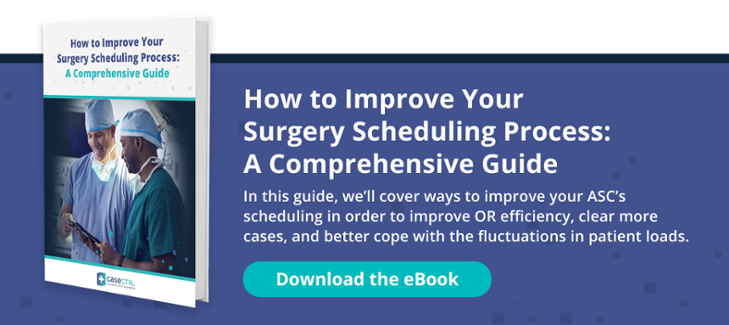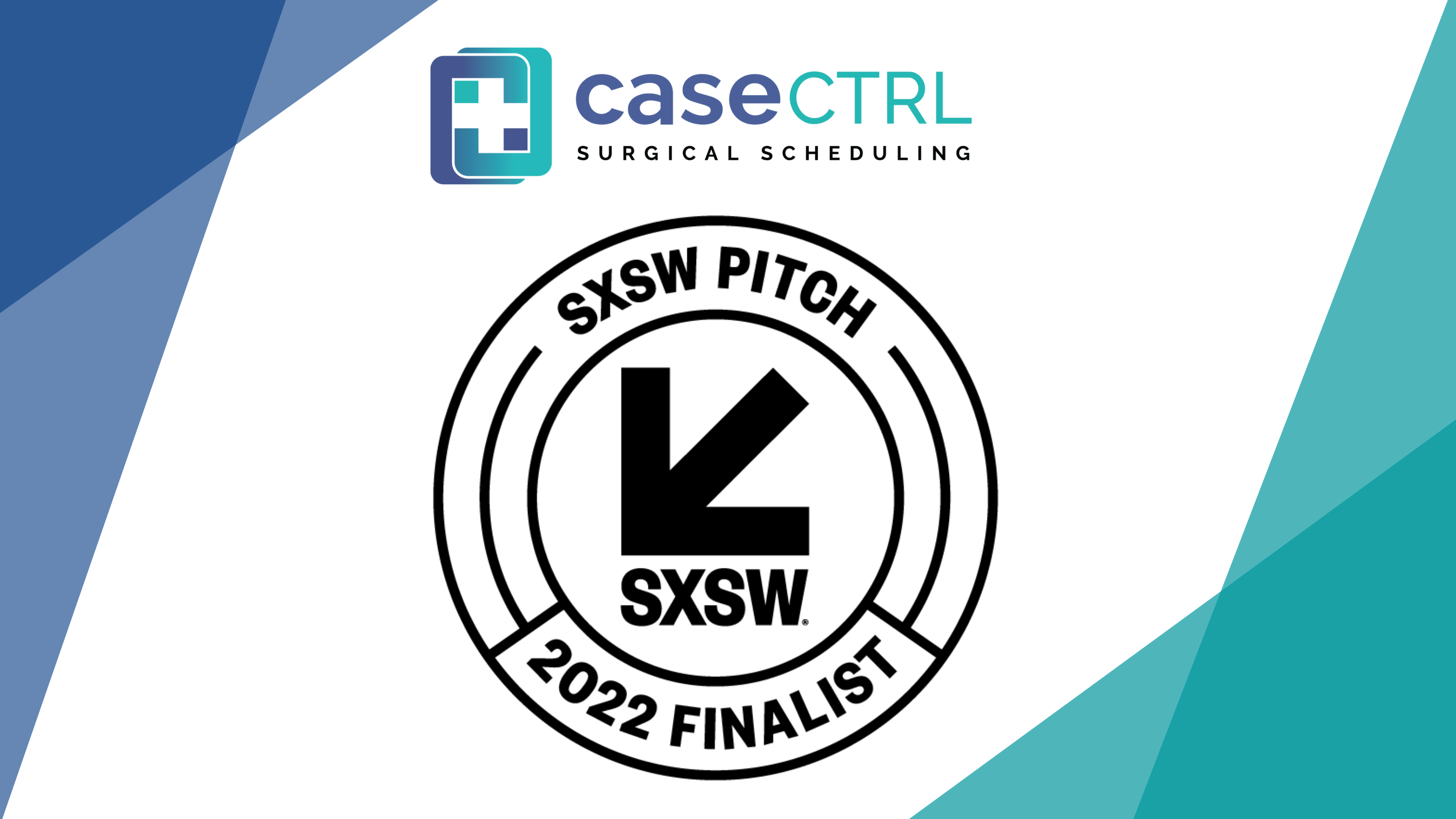Communication is not a “soft skill” for operating rooms. Every surgery has to go through a complex scheduling process that often includes verification, patient consent, strategic timing, room prep, logistics, post-op arrangements, etc. Communicating accurate information, efficiently, is as important as surgical protocol to positive outcomes. And often it falls to one or two schedulers to wrangle all of the necessary information and disseminate it. Despite available tools to enhance their schedulers’ abilities, many ASCs and hospitals live in a siloed world of ambiguous, manual surgery scheduling communication processes. Bad communication leads to less efficiency, a worse patient experience, and a chaotic, error-prone work environment. Let’s explore 6 top communication problems in surgery scheduling that can’t simply be fixed by leaning harder on our schedulers.
1. Errors and Omissions
Case management begins with receiving all of the necessary information to get a patient in the schedule where they belong. Prior to posting a case, the scheduler needs to know the patient’s name, surgeon’s name, and their assisting personnel; billing code or description of the planned procedure (site/side) and associated diagnoses codes; proposed anesthesia; necessary clearances/labs; surgical preparation instructions; list of instruments and implants; and surgical time estimate. They also need insurance approval and patient consent. Sometimes they have to schedule a pre-op with the anesthesiology staff.
Faxes, paper forms, phone calls, emails, excel sheets and white boards are common tools that even very large hospitals and ASCs use to receive and confirm all of this scheduling information. Simple errors and omissions are inevitable when manual systems are used for reception, entry, and posting for surgery scheduling:
- Voice Calls: Illinois Sports Medicine & Orthopedic Surgery Center's scheduling office stopped taking schedule requests over the phone because of the potential for general misspeaking, mis-hearing, or forgetting; and "even if the surgery scheduler scrupulously asks for and enters all the required information known at that time, the surgeon's office staff may forget to include an essential specialty item needed for the case."
- Paper Forms: the same ASC found that paper forms were problematic because portions are often left blank, which risks crucial omissions. Digital forms can require information to be filled and can populate that information elsewhere. The same goes for insurance authorization and patient consent forms. The absence of these digital forms can trigger alerts to the scheduler.
- Preoperative Notes: One study found that by allowing doctors to enter patient information in real time during pre-operative visits, they reduced site/side discrepancies to zero and reduced changing sequences of surgery by 70%. Why? The schedulers had timely information that might have otherwise been omitted.
2. Inaccuracies in Manual Processes
Even if information is technically entered into the scheduling pipeline, it doesn’t mean that information is accurate for each unique surgery. Surgeons may habitually underestimate or overestimate surgery times due to poorly designed procedure codes or forms. Paper forms depend on the surgeon to make extensive notes, which then have to be interpreted by the scheduler. Digital forms, on the other hand, allow much more information to be communicated, which may affect sequencing.
Surgeon preferences can also lead to inaccurate ordering of equipment or staffing, which causes downstream delays. Some practices depend on a superstar scheduler to know each surgeon's preferences; others depend on surgeon preference cards that can easily get outdated or misplaced. It’s no wonder that average first cases do not start on time, often delayed by 30 minutes or more. Modern ORs use software that includes surgeon preferences that can be easily updated over time.
3. Over-Reliance on Scheduler’s Knowledge for Success
If your scheduler were to take six months off, would it affect the practice? ORs that depend on manual processes would likely be thrown into chaos for a bit. Good schedulers contribute the most value to creative problem solving in an ever shifting schedule. They shouldn’t be holding the practice together with post-it notes and memory tricks.
Under the pressure of block scheduling and negotiating open time with surgeon offices, a scheduler may be unconsciously padding blocks to prevent overtime or showing preference to the loudest physicians to fit in extra cases. They may also be counted on to interpret notes or make educated guesses when forms are incomplete.
If the scheduling system is an amalgam of excel sheets, paper forms, faxes, and boards, there is an easy fix: consolidate into a software solution. The scheduler's voice is amplified by real-time software with reminders, auto-populated forms, and direct feedback from other stakeholders.
4. Lack of Communication About Accountability
Whose fault is it when utilization rates drop? Block schedules usually leave around 20% of total time open to take on emergent cases by request. Overall, blocked time is often expected to have a utilization rate of 75-80%.
According to an Anesthesiology News study of operating room delays over the course of 15,500 cases at a large hospital, the two major reasons for delays were 1. Nurses did not have the room ready; and 2. Surgeons had submitted incomplete notes, consent, and patient marking. Of course this is not always the case, but when it is, how can a paper process establish the facts? It cannot. A digital scheduling interface captures data and flow of information that can then be discussed constructively.
On the other hand, surgery scheduling software can hold the hospital or ASC accountable for how they determine which surgeons receive open time slots, how they justify changes to blocks, and how they choose vendors and products.
5. Disconnect Between Stakeholders and Schedulers
Schedulers may suffer too much redundancy in communication in some areas, while they also aren’t able to keep open channels with some important stakeholders, such as surgeons, physicians’ staff, and equipment vendors.
Open time is critical and is often filled with emergent cases that can’t wait. If the onus of granting that time is on the scheduler alone, they are bound to let someone down. Scheduling software can provide a master view of the statuses of both pending cases (to help schedulers determine when to release time) and newly opened blocks. Automated messages are triggered when statuses change. This takes the inefficiency (and sometimes favoritism) out of open-time requests. Equally important, it can establish rules for filling open time.
A schedule that lives remotely across devices increases the odds that surgeons will add up-to-date information or give better warning of cancellations on their part. Issues can be resolved with fewer calls and less waste.
Having the wrong equipment can cause frustrating delays, sometimes for days. Schedulers can benefit from a communication platform that can be shared with vendors for up-to-date information about OR needs.
6. Losing Touch With Patients
With all of the logistical communication and efficiency maximizing, it’s easy to forget that patients require follow-ups and prompts to make it through to surgery. A chaotic scheduling system can cause unnecessary delays in communicating with the patient about available dates.
Patients need to receive messages regarding insurance and financial obligations, pre-operative procedures, and education. Surgery scheduling software can offer personalized, yet automated communication with patients and assure that they are reached through the channels most likely to reach them.
Research on patient no-shows revealed that patient scheduling conflicts and miscommunication were the most common causes across various settings. No-shows can be dramatically reduced simply by using automated reminders a day prior to surgery.
These communication problems aren’t habits to be solved so much as they are natural outgrowths of human limitations in a complex environment. The future of healthcare needs to harness human decisions and insulate them from redundant and overwhelming admin work. Surgery scheduling software will be indispensable to this future: learn more.







































